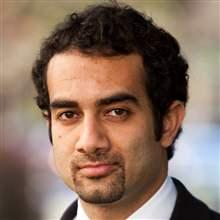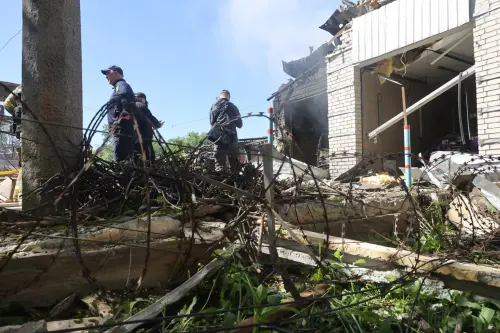|
 Khaled Elgindy, Fellow, Center for Middle East Policy, Foreign Policy Program: Khaled Elgindy, Fellow, Center for Middle East Policy, Foreign Policy Program:
Great piece, Dan. So, if the goal is to convince the other side that attacks on Israel “are too costly to carry out,” than disproportionality is by definition intended to maximize rather than minimize the harm to the other side. In which case, doesn’t that also mean that the enormous civilian casualty rate ( about 75 percent) is on some level intentional?
|
|
 Daniel Byman, Senior Fellow and Director of Research, Center for Middle East Policy, Foreign Policy Program: Daniel Byman, Senior Fellow and Director of Research, Center for Middle East Policy, Foreign Policy Program:
My sense (and here I’ll defer to Natan) is that the IDF (Israel Defense Forces) gets and gives somewhat contradictory orders on this. There is both a strong and formal “when possible, try to avoid killing civilians” order, but also a message of “show them we mean business” and, of course, “protect the troops at all cost” (which can mean you bring down the building rather than try to clear it room by room to avoid civilians). So I think Israel often tries to do both proportionality and deterrence, and as a result both suffer.
|
|
 Natan Sachs, Fellow, Center for Middle East Policy, Foreign Policy Program: Natan Sachs, Fellow, Center for Middle East Policy, Foreign Policy Program:
As you point out, Dan, I think the main difference is between the tactical and the operational levels. Israeli troops, as a rule, do not try to kill civilians, contra frequent accusations in social media and in the press, but the Israeli operation as a whole is not as sensitive to civilian casualties as it might be. From the Hamas side, of course, civilian casualties are the point, though in this round they have so far succeeded mostly in producing Palestinian civilian casualties.
On the tactical level, the Israeli standing orders are very clear – rehearsed by every soldier from day one – and they are to avoid civilian casualties when possible. This includes routine procedures for encounters and especially for airstrikes, many of which are canceled if the pilot or other visual intel identifies bystanders. There are now also actual lawyers in the forward war room for some operations. That’s of course much harder to do with infantry in actual combat, where their own lives are more at risk and they necessarily have to be more cautious, which can mean more aggressive measures in combat. Similar dilemmas are faced by American troops in asymmetric warfare.
But “when possible” of course depends on the setting, the orders, and the spirit of the orders from above. In the Hamas/Gaza case, where it is both harder to avoid civilians, and where the enemy is intent on causing civilians casualties even among the people it rules, it is very different than in others. With a mission that is vaguely defined by the high command, especially, it can entail less caution among the troops.
On the operational level, however, the Israeli decision to push on is also motivated by the desire to project strength and to deter Hamas, as you point out, Dan. As you also point out, this is complicated by Israel’s acute sensitivity to its own casualties, and especially POWs (prisoners of war), which weakens its hand in the game of chicken you describe, which in turn produces less sensitivity to civilian casualties on the other side.
As I’ve noted elsewhere, however, the focus on the Israeli decisions alone is a bad mistake in my view. Palestinians, contrary to the tone of many Palestinian politicians and commentators, have agency: they too can shape the course of events. That this conflict, with all the complications that the arena poses, would entail such tragic consequences was known to Hamas as well as to Israel. I’m not surprised by Palestinian rage toward Israel at the moment, and Israel could have done things far better; I am dismayed by the lack of Palestinian rage toward Hamas.
|
|
 Tamara Cofman Wittes, Senior Fellow and Director, Center for Middle East Policy, Foreign Policy Program: Tamara Cofman Wittes, Senior Fellow and Director, Center for Middle East Policy, Foreign Policy Program:
The demonstrations Friday in Jerusalem and the West Bank suggest that we might now be heading down an even darker road. If a cease-fire takes three more days, as some reports suggest, I hope that won’t be too late.
|
|
 Salman Shaikh, Director, Brookings Doha Center and Fellow, Center for Middle East Policy, Foreign Policy Program: Salman Shaikh, Director, Brookings Doha Center and Fellow, Center for Middle East Policy, Foreign Policy Program:
With the West Bank protests starting up and lives being lost, I suspect that it will take some doing (even for Qatar and Turkey) to get Hamas to agree to any ceasefire proposal in the next few days. They are more popular in the West Bank than Abbas (and even Gaza), especially now. At a minimum, they will drive an even harder bargain.
|
|
 Michael Doran, Senior Fellow, Saban Center for Middle East Policy, Foreign Policy Program: Michael Doran, Senior Fellow, Saban Center for Middle East Policy, Foreign Policy Program:
Not sure the Israelis will go all the way, but they’ll proceed to its outskirts.
|
|
 Khaled Elgindy: Khaled Elgindy:
Just so I’m clear, what exactly is “all the way”?
|
|
 Michael Doran: Michael Doran:
Re-occupation and effort to topple Hamas.
That being said, I think Netanyahu will come out in “okay” shape. Hamas will be the loser. Lots of variables, but that’s my prediction. You can all ridicule me if I’m wrong. But if I am right, I reserve the right to be insufferable for a week.
|
|
 Shadi Hamid, Fellow, Project on U.S. Relations with the Islamic World, Center for Middle East Policy, Foreign Policy Program: Shadi Hamid, Fellow, Project on U.S. Relations with the Islamic World, Center for Middle East Policy, Foreign Policy Program:
When you say Hamas will end up the loser, how do you define “lose”? Seems like they have more going for them right now, especially with developments in the West Bank (AWRAD’s just released poll of West Bankers has mostly good news for Hamas). Of course, a lot will depend on the eventual ceasefire terms, but I’m just curious how we make the assessment of Hamas’s success or failure in the coming weeks/months.
|
|
 Michael Doran: Michael Doran:
As for Shadi’s question, about what “lose” means, it’s not an easy question, because Hamas will probably stay in power in Gaza. Rooting them out is too difficult for anyone to take on. Even if Netanyahu’s war aims expand beyond destroying tunnels to significantly degrading Hamas, I doubt he will go for broke and try to topple it entirely. Doing so would require occupying a hostile population for a very long time. So the mere fact of surviving will give Hamas the ability to claim victory, like so many Arab leaders have done in the past after taking their people into fruitless wars. Some western academics and apologists will echo Hamas’s claims of “divine victory,” to borrow a phrase from Nasrallah in 2006, but having the professors on your side is hardly a pride-worthy distinction.
Hamas looks strong now, because of the surge of public opinion in its favor. But that is transitory. After the dust settles, even Palestinian public opinion will not support Hamas at renewed levels. Six months from now, many Palestinians, especially those in Gaza, will ask themselves what all the pain and destruction that Hamas brought down on them was worth. Their disgruntlement will not weaken Hamas’s grip on power, because it is a dictatorship supported by foreign money. But the organization, as it stands before its people and lectures them on the need for more sacrifice, will surely clock the sullen faces that stare blankly back. As for the “support” that Hamas gets from public opinion in other parts of the Arab world that will certainly dissipate. Of course, it’s never been worth much anyway, throughout modern Arab history, because it never translates into lasting change in the behavior of states, the true power brokers in the region.
Meanwhile, Hamas will have lost considerably on the battlefield. Its extensive tunnel network will have been destroyed, and it will have lost many fighters. Its capabilities will be so degraded that it will take years to rebuild. And the reconstruction will take place in more difficult conditions, given that Hamas is now surrounded by a vice in the form of the Egyptian-Israeli alliance.
On top of all that, the world is about to notice something surprising. The United States is not as engaged and as influential as it was in the past, and, here’s the surprising bit: that fact translates into very bad news for Palestinian nationalists. The mechanism by which the world constrained Israel was America. While that mechanism is not entirely gone, it is weak. Increasingly, Israel is going to look after its self-defense according to its own lights. Hamas’s answer to that challenge is not an answer at all, and if it persists, it will only succeed in bringing down untold suffering on its own people.
So I am defining “loss” as a massive sacrifice, both by the organization and the people over whom it rules, in return for less than nothing.
|
|
 Shadi Hamid: Shadi Hamid:
Even if Hamas “loses” in the ways that you describe, it seems to me that they’re likely to at least be better off than they were before the conflict started. It’s hard to envision any ceasefire arrangement that won’t include easing the blockade in some way (Hamas has little incentive to agree to a ceasefire that doesn’t alleviate the humanitarian crisis in Gaza). The West Bank surge in pro-Hamas sentiment isn’t just about public opinion; it’s about closing the gap between Hamas and Fatah. If the developments in the West Bank underscore anything, it’s the real, and growing, desire for Palestinian unity. Last week on MSNBC, Mustafa Barghouti said that a new uprising had started. He may be getting ahead of himself, but if a ceasefire doesn’t hold in the coming days, there will be more instability in the West Bank (and corresponding anti-Palestinian sentiment) and that can only strengthen Hamas hand during post-ceasefire negotiations over contours of unity government. Also, the expectation, which I suppose is implicit in these Israeli deterrence operations, is that at some point Palestinians will blame Hamas more than they blame Israel. But, there’s little to suggest this is how most Palestinians process the results of Israeli military operations.
|
|
 Michael Doran: Michael Doran:
Concessions on easing the blockade are largely symbolic, because, when all is said and done, Egypt and Israel control the exits. Also, the Israelis and Egyptians, in my view, are going to make sure that this ends on terms that are advantageous to them. It will either end, therefore, with a ceasefire agreement close to the one the Egyptians offered Hamas up front, or it will end without any formal agreement. Hamas will simply begin holding its fire and Israel will pull back unilaterally. Hamas will claim that it never buckled and Israel will get the quiet it craves. As for Palestinian unity, I wouldn’t hold my breath. It has never existed in the past, and this conflict won’t bring it about. I’m sure that Palestinians blame Israel bitterly, much more than they blame Hamas. But hatred is not a sound basis for national unity. Gaza and the West Bank are on different historical trajectories, and this conflict is not going to change that basic fact. On the contrary.
And as for hating Israel more than Hamas, I’d add this footnote: I’m willing to bet that for some significant minority of Gazans – how big a segment I can only guess – one of the things that they hold against Israel is the fact that it, as they see it, placed Hamas in power over them. I could be wrong. I’ve never been to Gaza and maybe the people there are made of something I have never seen before. But elsewhere in the Middle East, as you well know, that’s the kind of thing one often hears, about Israel and America, when people complain about the dictators ruling over them.
Regarding the notion that the Gazans will reserve their rage exclusively for the Israelis, see Anne Barnard’s piece. Even if Hamas only “urged” the residents of Shuja’iyya to stay put and did nothing to discipline those who did not heed the advice, I would guess that those who lost family members in the bombing did not come away from the experience with warm feelings for the Resistance. As I say, I’m not building on that one bit. I don’t believe that public opinion matters much. The people of Gaza will probably have no choice after the war but to express their undying loyalty to Hamas. But I also don’t assume that the words that they say out loud have much relationship to the actual feelings in their hearts.
|
|
 Salman Shaikh: Salman Shaikh:
As someone who has lived in Gaza, travelled there frequently (though not since 2011), I would say that Hamas’s popularity wanes when: a) it is unable to provide services (a symptom of a persistent monthly budget deficit and related, and the siege), b) its social and political authoritarian tendencies exhibit themselves (a source of real irritation among Gazans) and c) because it too is seen as being corrupt (that is what happened when the old Gaza elite was replaced by a new business elite synonymous with the tunnel economy). I would be surprised if its popularity wanes during or at the end of this conflict, though this could depend on who takes the credit for lifting the siege (Abbas or Hamas).
|
|
 Bruce Riedel, Senior Fellow, Center for Middle East Policy and Center for 21st Century Security and Intelligence and Director, Intelligence Project, Foreign Policy Program: Bruce Riedel, Senior Fellow, Center for Middle East Policy and Center for 21st Century Security and Intelligence and Director, Intelligence Project, Foreign Policy Program:
The history of air warfare is actually very simple: if you terrorize the target (Rotterdam) quickly they fold. If you don’t, the civilian population rallies behind the regime for the duration (London, Berlin, Hanoi).
|
 Khaled Elgindy, Fellow, Center for Middle East Policy, Foreign Policy Program:
Khaled Elgindy, Fellow, Center for Middle East Policy, Foreign Policy Program: Daniel Byman, Senior Fellow and Director of Research, Center for Middle East Policy, Foreign Policy Program:
Daniel Byman, Senior Fellow and Director of Research, Center for Middle East Policy, Foreign Policy Program: Natan Sachs, Fellow, Center for Middle East Policy, Foreign Policy Program:
Natan Sachs, Fellow, Center for Middle East Policy, Foreign Policy Program: Tamara Cofman Wittes, Senior Fellow and Director, Center for Middle East Policy, Foreign Policy Program:
Tamara Cofman Wittes, Senior Fellow and Director, Center for Middle East Policy, Foreign Policy Program: Salman Shaikh, Director, Brookings Doha Center and Fellow, Center for Middle East Policy, Foreign Policy Program:
Salman Shaikh, Director, Brookings Doha Center and Fellow, Center for Middle East Policy, Foreign Policy Program: Michael Doran, Senior Fellow, Saban Center for Middle East Policy, Foreign Policy Program:
Michael Doran, Senior Fellow, Saban Center for Middle East Policy, Foreign Policy Program: Shadi Hamid, Fellow, Project on U.S. Relations with the Islamic World, Center for Middle East Policy, Foreign Policy Program:
Shadi Hamid, Fellow, Project on U.S. Relations with the Islamic World, Center for Middle East Policy, Foreign Policy Program: Bruce Riedel, Senior Fellow, Center for Middle East Policy and Center for 21st Century Security and Intelligence and Director, Intelligence Project, Foreign Policy Program:
Bruce Riedel, Senior Fellow, Center for Middle East Policy and Center for 21st Century Security and Intelligence and Director, Intelligence Project, Foreign Policy Program:


Commentary
Around the Halls: The Crisis in Gaza Deepens
July 28, 2014